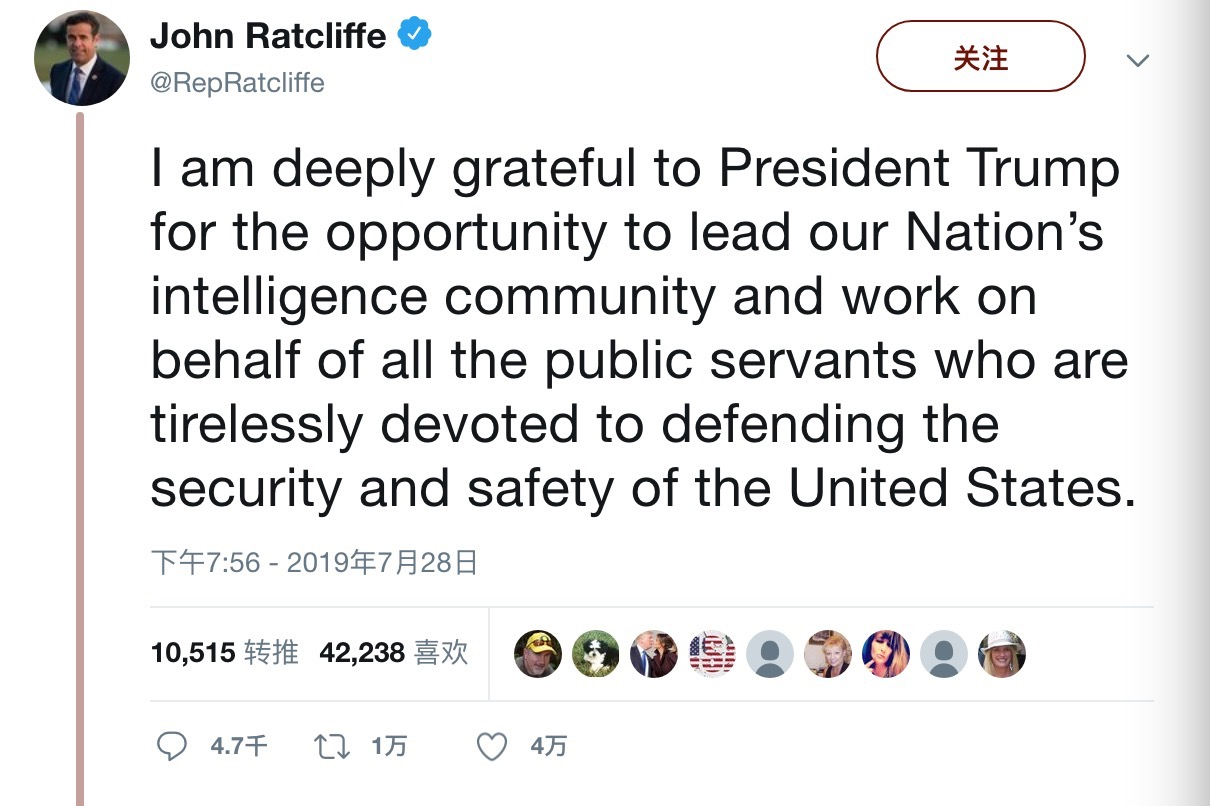Major Power Relations
Your Present Location: PROGRAMS> Major Power RelationsRatcliffe: Potential U.S. spy chief is Trump's next 'yes-man'
Source: CGTN Published: 2019-8-1
You are only as good as the information you're given, but what if that information only consists of what you want to hear? U.S. President Donald Trump continues to abide by this modus operandi with the nomination of Republican Congressman John Ratcliffe as his national intelligence director. On the way out is Dan Coats, who has at times contradicted Trump in his assessment of foreign threats.
"A former U.S. Attorney, John will lead and inspire greatness for the Country he loves," Trump wrote on his Twitter page. The president said that Coats is expected to leave the position on August 15.

Ratcliffe's Twitter post
A green hand
Ratcliffe's ascent to become the nation's top intelligence adviser began with high drama. His grilling last week of Robert Mueller for the latter's investigation into the Russian interference in U.S. elections demonstrated clear support for Trump. A former U.S. attorney, Ratcliffe said that Mueller's report detailing Trump's potential obstruction of justice "was not authorized under the law to be written."
Ratcliffe assumed the role of inquisitor during the testimony because he is serving on the House Intelligence Committee, which he only joined this January. He also has scant experience in intelligence or foreign policy, which all past intelligence directors had in spades. The law even requires that the holder of the position have "extensive national security expertise." This pattern of inexperience – and apparent loyalty to Trump – worries Ratcliffe’s critics, including several Democratic senators, who argue that the role of an intelligence director should be nonpartisan and backed by a thick resume. The success of Ratcliffe’s nomination depends on Senate confirmation.
After getting his law degree from Southern Methodist University in Dallas, Ratcliffe served four terms as the mayor of Heath, a small Texas town by Dallas. He then took on the post of a U.S. attorney, claiming on his congressional website that he had "arrested 300 illegal aliens in a single day." Ratcliffe also stated that during that stint, he had overseen national security investigations in the Eastern District and prosecuted terrorism cases.
Reporting by the New York Times and the Intercept, however, contradict that record. Ratcliffe claims to have put terrorists in prison as a special prosecutor in the U.S. government’s case against the Holy Land Foundation, a Texas-based Islamic charity accused of funneling money to the Palestinian militant group Hamas. However, FBI officials and government lawyers directly involved in the case said Ratcliffe played no substantial role in the case, which was prosecuted in a different Texas district than the one that he oversaw.
U.S. Director of National Intelligence (DNI) Dan Coats listens during a cabinet meeting held by U.S. President Donald Trump at the White House in Washington D.C., July 18, 2018. /VCG Photo
Integrity of information at stake
If Ratcliffe does succeed in becoming the director of national intelligence, it shows that Trump is continuing his tradition of surrounding himself with "yes-men".
The post was created after 9/11 by George W. Bush to coordinate the efforts of U.S. intelligence agencies. The director is supposed to be the face of intelligence assessments in the White House, and considered part of the president’s inner circle.
Dan Coats, the outgoing director, lost that privilege with Trump, who is known to disregard information that contradicts his preferences. "It didn't help that Coats gave unwelcome critical assessments regarding the nuclear capabilities of the Democratic People's Republic of Korea and Russian involvement in U.S. elections, in sharp contrast to the president's public statements that there was no interference," said Zhao Minghao, a senior research fellow at the Charhar Institute, during an interview with CGTN.
It's not been an easy job for Coats during the past two years, and he’s now one of the last senior officials who contradict the president to leave the Trump administration.
Ratcliffe, on the other hand, is a staunch conservative who will most likely go wherever Trump leads. He has a highly conservative voting record in Congress and is even considered too political to be the next national intelligence director by fellow Republican Richard Burr, a senior U.S. senator on the Senate Select Committee on Intelligence that will consider Ratcliffe's nomination.
The congressman's legislative record is one that has aligned with Trump's positions, according to Zhao Minghao, also an adjunct fellow at the Chongyang Institute for Financial Studies at Renmin University of China. Ratcliffe was one of the Republicans to sign a letter to the Federal Communications Commission calling for the end of net neutrality – believed to be the pillar of a democratic internet.
Surrounded by one mind
From economic adviser Larry Kudlow to new press secretary Stephanie Grisham, Trump has roiled the White House in the past couple of years by filling up key positions with people he trusts – in other words, those who do and say what he wants. Even those who had offered constructive criticism like Coats and former secretary of state Rex Tillerson have raised the president's ire.
Nominating John Ratcliffe is, therefore, no surprise. However, "he has limited experience in military, intelligence and diplomacy. Actually it’s a grueling job to coordinate the 16 intelligence agencies," Zhao told CGTN.
His path to intelligence director doesn't look smooth as senators and other politicians question his lack of experience and impartiality in a role that delivers the country's most authoritative intelligence assessment to a man who has shown little regard for facts.
Zhao Minghao is a visiting fellow at the Chongyang Institute for Financial Studies at Renmin University of China.























































































 京公网安备 11010802037854号
京公网安备 11010802037854号





